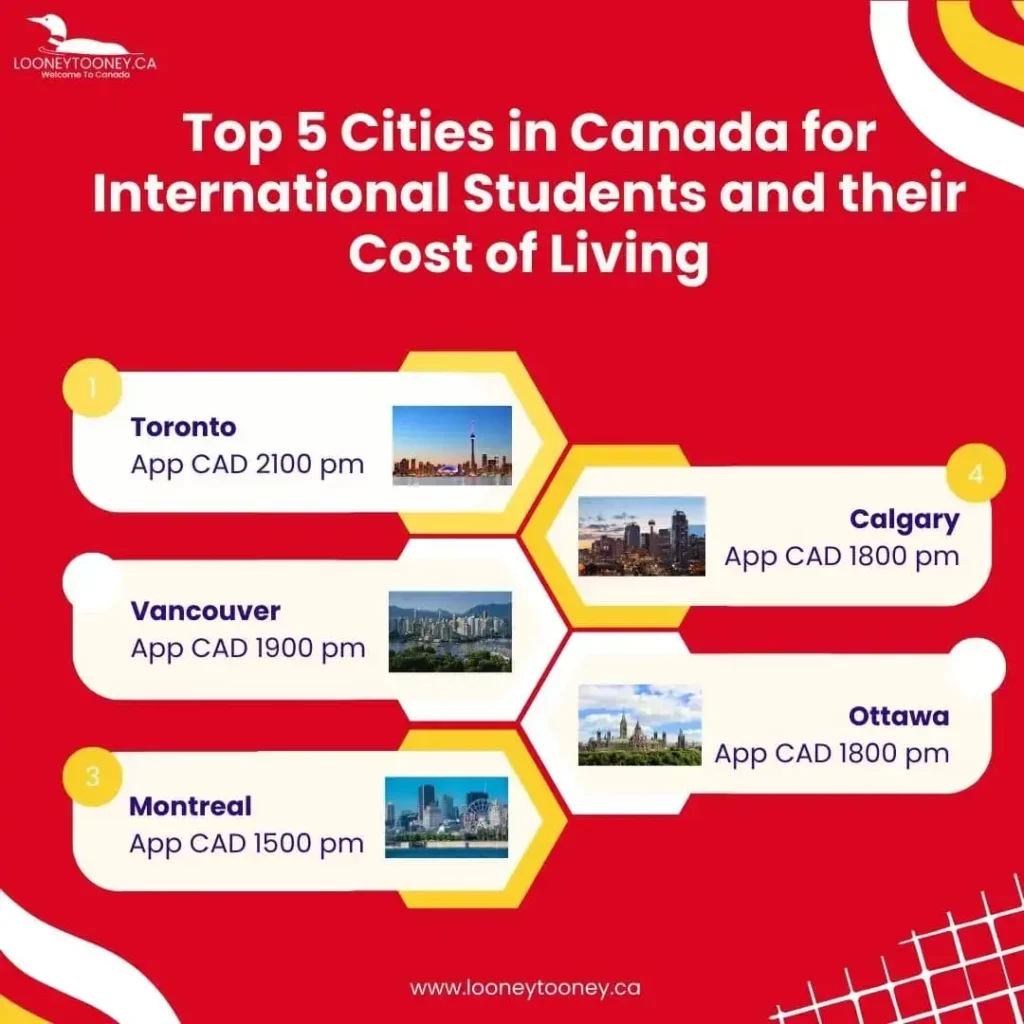Studying in Canada has become a dream for many international students. They seek quality education and a multicultural experience there. However, one of the most important aspects to consider when thinking of studying is the living cost in Canada for international students.
As an international student, knowing and comparing living expenses across different cities is crucial for effective financial planning. In this comprehensive guide, we will go into a detailed comparison of living costs in Canada for international students. This will help you make an informed decision for your educational journey.
Table of Content:
- Factors Influencing Living Cost in Canada for International Students
- City-Wise Living Cost in Canada for International Students
- Summary of Cost of Living in Canada for International Students
- FAQs on Living Cost in Canada
Factors Influencing Living Cost in Canada for International Students
Before diving into the city-wise comparison of living cost in Canada for international students, it is essential to understand the key factors that make up the living expenses. These factors can vary differ from one city to another and have an impact upon your overall budget. Some of the main factors are:
- Accommodation: This is the most important cost after college fees. This depends on factors such as city, neighborhood, type of accommodation, and the number of roommates.
- Transportation: Most Canadian cities have a well-connected public transportation system. So you may get more affordable commuting options instead of owning a car.
- Food and Groceries: The cost of groceries and dining out depends on city-specific factors and personal choices. Read on to get a city-wise comparison.
- Utilities: Factors such as electricity, water, heating, cooling, and internet services, are also significant expenses.
- Healthcare and Insurance: In Canada, international students also need health insurance. This varies according to the city and coverage.
- Entertainment and Lifestyle: One more expense to consider is the cost for leisure activities, socializing, and cultural experiences. This also differs across cities
City-Wise Living Cost in Canada for International Students
Each of the Canadian cities offers a distinct student-friendly experience, ranging from multicultural vibrancy to natural beauty and academic excellence.

1. Toronto
Toronto boasts a multitude of universities, including the University of Toronto, Ryerson University, York University, and more. With a diverse student population, it’s a melting pot of cultures. The city’s student-friendly atmosphere is enhanced by its accessible public transportation, friendly areas to live, numerous student discounts, and a wide range of entertainment options.
The variety of part-time job opportunities reflects the city’s dynamic and thriving economy, making it a favorite among international students. The cost of living in Toronto is relatively high, with average monthly expenses for a student estimated at around $1,200 to $2,500. Rent for a shared accommodation could cost around $600 to $1,200, depending on the area. Here is a breakdown of the expenses:
| Accommodation (Monthly) | $800 – $1,500 |
| Transportation (Monthly) | $122 |
| Food and Groceries (Monthly) | $300 – $400 |
| Utilities (Monthly) | $50 – $100 |
| Healthcare and Insurance (Annual) | $600 – $800 |
| Entertainment and Lifestyle | $150 – $300 |
2. Vancouver
Vancouver is home to institutions like the University of British Columbia and Simon Fraser University. Known for its breathtaking natural beauty, the city is highly student-friendly. Students can enjoy outdoor activities, explore Stanley Park, and even ski in the nearby mountains.
The city’s public transportation, eco-conscious lifestyle, and proximity to nature make it an ideal place for students to study and work. Living in Vancouver can be expensive, with monthly expenses ranging from $1,000 to $2,500. Rent for shared accommodation might cost around $600 to $1,200, varying by neighborhood. Here is a breakdown of the expenses:
| Accommodation (Monthly) | $700 – $1,200 |
| Transportation (Monthly) | $98 |
| Food and Groceries (Monthly) | $250 – $350 |
| Utilities (Monthly) | $50 – $100 |
| Healthcare and Insurance (Annual) | $600 – $800 |
| Entertainment and Lifestyle | $100 – $250 |
3. Montreal
McGill University, Université de Montréal, and Concordia University are among Montreal’s esteemed institutions. As a bilingual city, Montreal offers a unique cultural experience. The city is known for its vibrant arts scene, affordable cost of living, and diverse neighborhoods.
With an abundance of cafes, cultural festivals, and student-oriented events, Montreal’s lively atmosphere makes it a haven for both learning and socializing. Montreal offers a more budget-friendly experience, with average monthly expenses ranging from $800 to $1,800. Rent for shared accommodation could be around $400 to $800, making it one of the more affordable options. Here is a breakdown of the expenses:
| Accommodation (Monthly) | $500 – $900 |
| Transportation (Monthly) | $50 |
| Food and Groceries (Monthly) | $200 – $300 |
| Utilities (Monthly) | $40 – $80 |
| Healthcare and Insurance (Annual) | $600 – $800 |
| Entertainment and Lifestyle | $100 – $200 |
4. Calgary
Calgary hosts the University of Calgary, attracting students with its balance of academic excellence and adventure. The city is known for its friendly locals and strong sense of community. With easy access to hiking, skiing, and other outdoor activities, students can maintain a healthy lifestyle while pursuing their studies.
Calgary’s supportive environment encourages students to engage in extracurricular activities, creating a well-rounded experience. The cost of living in Calgary falls within a moderate range, with average monthly expenses ranging from $1,000 to $2,000. Shared accommodation could cost around $500 to $1,000, varying by location. Here is a breakdown of the expenses:
| Accommodation (Monthly) | $600 – $1,100 |
| Transportation (Monthly) | $103 |
| Food and Groceries (Monthly) | $250 – $350 |
| Utilities (Monthly) | $40 – $80 |
| Healthcare and Insurance (Annual) | $600 – $800 |
| Entertainment and Lifestyle | $100 – $200 |
5. Ottawa
Ottawa, housing the University of Ottawa and Carleton University, offers a unique blend of education and professional opportunities. As the capital city, it’s rich in history and government institutions. The city’s size allows for a more intimate and personalized experience, and students can engage in internships and networking events related to their fields of study.
Ottawa’s serene environment, cultural attractions, and focus on education create a conducive atmosphere for academic success. Ottawa’s cost of living is moderate, with average monthly expenses ranging from $800 to $1,800. Rent for shared accommodation might cost around $500 to $1,000, depending on the area. Here is a breakdown of the expenses:
| Accommodation (Monthly) | $600 – $1,000 |
| Transportation (Monthly) | $97 |
| Food and Groceries (Monthly) | $250 – $350 |
| Utilities (Monthly) | $40 – $80 |
| Healthcare and Insurance (Annual) | $600 – $800 |
| Entertainment and Lifestyle | $100 – $200 |
Regardless of your choice, these cities provide international students with an enriching blend of education, job opportunities, and cultural exploration.
Summary of Cost of Living in Canada for International Students
There are many aspects of your monthly budget. We have a breakdown of the same to ease your educational voyage. Let’s look at a detailed comparison of living cost in Canada for international students in 2024:
| City | Accommodation (Monthly) | Transportation (Monthly) | Food and Groceries (Monthly) | Utilities (Monthly) | Healthcare and Insurance (Annual) | Entertainment and Lifestyle |
| Toronto | $800 – $1,500 | $122 | $300 – $400 | $50 – $100 | $600 – $800 | $150 – $300 |
| Vancouver | $700 – $1,200 | $98 | $250 – $350 | $50 – $100 | $600 – $800 | $100 – $250 |
| Montreal | $500 – $900 | $50 | $200 – $300 | $40 – $80 | $600 – $800 | $100 – $200 |
| Calgary | $600 – $1,100 | $103 | $250 – $350 | $40 – $80 | $600 – $800 | $100 – $200 |
| Ottawa | $600 – $1,000 | $97 | $250 – $350 | $40 – $80 | $600 – $800 | $100 – $200 |
Note: All figures are approximate and in Canadian dollars.
In conclusion, the cost of living for international students in Canada varies according to the city. The most expensive cities are Toronto, Vancouver, and Calgary, with average monthly expenses of $2,000 – $3,000. Montreal and Ottawa are more affordable, with average monthly expenses of $1,500 – $2,000. When planning your budget, it is important to factor in the cost of living in the city you choose to study in.
Making an Informed Decision
Choosing the right city to study in depends on a balance between academic opportunities and financial considerations. In Canada, cities like Toronto and Vancouver offer vibrant cultural experiences and top-tier universities. However, they also come with higher living costs. On the other hand, cities like Montreal and Ottawa are more budget-friendly. They do not even compromise on quality education.
It is important to
- Detailed research of each city
- Consider your personal choices, and
- Create a thorough budget according to your needs.
Doing this will ensure a smooth and financially sustainable experience while pursuing your academic goals in Canada.
FAQs on Living Cost in Canada
To help you better understand the financial landscape, we have compiled a list of frequently asked questions that shed light on the factors influencing living costs, the affordability of Canadian cities, and what it takes to comfortably sustain yourself in this diverse and dynamic country. Explore these FAQs to make informed decisions and prepare for your life as a student in Canada.
Q. Is Canada costly for living?
A. Canada can be considered relatively expensive for international students, especially in major cities like Toronto and Vancouver. The cost of living, including accommodation and daily expenses, is a significant consideration.
Q. What is the cost of living in Canada per month?
A. The average monthly cost of living for an international student in Canada varies by city. On average, it can range from approximately $1,000 to $2,500, depending on the location and lifestyle choices.
Q. What salary do you need to live in Canada?
A. A general recommendation is to have a monthly income of around $2,000 to $3,000 to comfortably cover living expenses in cities like Toronto, Vancouver, and Calgary. However, costs can vary, and it’s essential to create a budget based on the specific city and your lifestyle.
Q. What are the main factors influencing the living cost for international students in Canada?
A. The primary factors include accommodation, transportation, food and groceries, utilities, healthcare and insurance, and entertainment and lifestyle.
Q. Which Canadian cities are more budget-friendly for international students in terms of living expenses?
A. Montreal and Ottawa are generally considered more budget-friendly, offering a lower cost of living compared to cities like Toronto and Vancouver.
Check out other related articles:
- Immigration Programs in Canada: A Detailed Handbook
- Best Areas To Live in Toronto
- Atlantic Immigration Program (AIP) – Eligibility, Process & Fee
- Express Entry System – Detailed Guide to Apply
Understanding the financial landscape is a crucial part of planning your education in Canada as an international student. By comparing international student living expenses in Canada in 2024, you can make an informed decision. Remember that while expenses are an important factor, the experiences and opportunities in each city are equally important in designing your overall educational journey.





